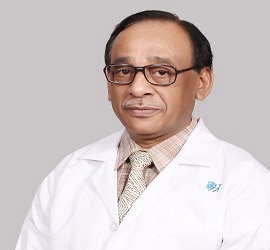
Dr. Shri Ram Kabra
Nephrologist
 Sarvodaya Hospital and Research Centre
Sarvodaya Hospital and Research Centre
 17 of experience
17 of experience
About Doctor
Dr. Shri Ram Kabra is a distinguished kidney transplant surgeon in India. He has experience of nearly 23 years. His areas of expertise include Kidney transplantation, Kidney stones treatment, dIalysis, Lithotripsy procedures, etc. Dr. Shri Ram Kabra graduated from Delhi University. Currently, he is the HOD & Senior Consultant - Centre for Dialysis & Kidney Transplant, Sarvodaya Hospital, Faridabad.
Dr. Shri Ram Kabra is a popular nephrologist in India. He has written and published several articles in several peer-reviewed journals. Dr. Kabra is dedicated to research and implementation of the latest procedures to ensure the best care for his patients. He is a member of the International Society of Nephrology, Indian society of Nephrology, etc.
Qualifications
- MBBS
- MD (General Medicine)
- DNB
Experience
- QRG Central Hospital, Faridabad as Consultant- Nephrology and HOD
- Shanti Mukund Hospital as Consultant- Nephrology and HOD
- Pushpawati Singhania Research Institute as Visiting Consultant
- PSRI, New Delhi as Clinical Associate – Nephrology
Specialization and Expertise
The signs and symptoms which lead to end stage kidney disease necessitating a kidney transplant are outlined below.
- Nausea
- Irregular Heartbeat
- Kidney Disease or Kidney Failure
- Fatigue
- Shortness of Breath
- Chest Pain or Pressure
- Weakness
- Decreased Urine Output (although occasionally urine output remains normal)
- Confusion
- Fluid Retention (causing swelling in your legs, ankles, or feet)
- Seizures or Coma (in severe cases)
End-stage renal disease (ESRD) or what is known as Kidney failure is a big sign for you to get a kidney transplant. Long term diabetes can bring your kidneys to this situation that you end up getting a kidney transplant. Your kidneys could be damaged also due to prolonged history of High Blood Pressure (Hypertension).
Popular procedures performed by Dr. Shri Ram Kabra are as follows:
- Kidney Transplant
The kidney transplant may involve retrieving the kidney from a deceased or a living donor. The word preemptive defines the kind of kidney transplant wherein the kidney is replaced prior to the point where your kidneys deteriorate so that you would need dialysis. It is also important to check if the transplanted kidney is working properly or not and regular checkups post the surgery are required to do so..
Memberships & Certifications
- Member International Society of Nephrology
- Member Indian society of Nephrology
- Member Delhi Medical association and Indian Medical association
Awards & Accomplishments
- Massive upper gastrointestinal hemorrhage. Gastrointestinal Endoscopy Vol 63, No. 6: 2006; 868-870
- Profile of acute renal failure in hepatitis E virus-related acute viral hepatitis. Abstract ISN CON 2006, Indian Journal of Nephrology, Vol 16, No.3, 2006; 101
- Symmetrical peripheral gangrene. Tropical Doctor, 2004; 34: 2-4
- Thesis on Hemostatic abnormalities in Thyroid dysfunction






